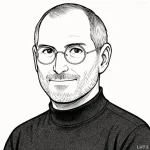“As Irving Good realised in 1965, machines with superhuman intelligence could repeatedly improve their design even further, triggering what Vernor Vinge called a ‘singularity.'”

- January 8, 1942 – March 14, 2018
- British
- Theoretical physicist, science writer
table of contents
Quote
“As Irving Good realised in 1965, machines with superhuman intelligence could repeatedly improve their design even further, triggering what Vernor Vinge called a ‘singularity.'”
Explanation
In this quote, Stephen Hawking refers to the concept of the technological singularity, a term coined by Vernor Vinge and based on ideas first articulated by Irving Good in 1965. The singularity describes a hypothetical point in the future where artificial intelligence (AI) surpasses human intelligence and enters a feedback loop of self-improvement. This would enable machines to design increasingly advanced versions of themselves without human intervention, leading to an explosive acceleration in technological progress that would fundamentally transform society.
Irving Good, a British mathematician and statistician, predicted that the development of superintelligent machines could lead to a runaway process of recursive self-improvement. Once a machine becomes capable of improving its own design, it could evolve at a pace far beyond human comprehension or control. This process could quickly spiral into a future where machines are vastly more intelligent than humans, leading to changes in society, economy, and even human existence itself. This idea was further popularized by Vernor Vinge, a science fiction writer and mathematician, who in the 1990s articulated the idea of the singularity in his influential essay, “The Coming Technological Singularity.”
In modern discussions about AI and the future of technology, the singularity has become a focal point of debate. Some see it as an inevitable and potentially beneficial leap forward, ushering in an era of unprecedented innovation and problem-solving. Others, like Hawking himself, have expressed concern that such rapid advancements in AI could lead to unpredictable consequences, potentially even threatening human autonomy and existence. While we have not yet reached the point where machines can autonomously design superintelligent systems, ongoing progress in AI, machine learning, and neural networks has sparked renewed interest in the potential for a technological singularity—and the need for ethical frameworks to guide its development.
Would you like to share your impressions or related stories about this quote in the comments section?


